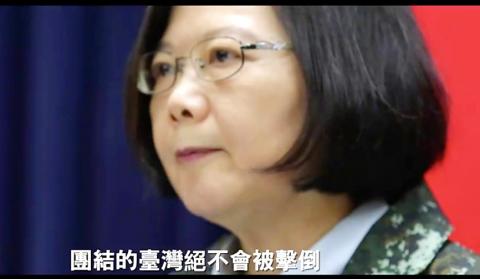A four-day drill conducted last month by the National Security Council (NSC) to test the government’s ability to respond to national security emergencies exposed various problems, and President Tsai Ing-wen (蔡英文) has called for improvements, a senior government official said yesterday.
The drill, which took place from Sept. 8 to 11, caught many government agencies off guard, as they had “no idea what resources were available and where to find them,” said the official, who spoke on condition of anonymity.
Tsai has asked for more training and improved coordination between government agencies and military units, the official added.

Photo courtesy of Military News Agency
More than 20 government agencies took part in the drill, they said.
The exercise, aimed at enhancing cross-departmental and inter-ministerial cooperation on emergency responses, requires government agencies to respond to nearly 100 national security threats to test if they can handle emergencies.
It is carried out by three groups: the drill group, consisting of all ministries under the Executive Yuan; the attack group, which simulates the threats; and the observer group, which evaluates the performance of the other groups, the official said.
The attack and observer groups each have about a dozen members and are respectively headed by former NSC secretary-general Chiou I-jen (邱義仁) and former NSC secretary-general Chen Chung-hsin (陳忠信), the official said, adding that about 500 people took part in the drill, including former military leaders and academics.
This drill found recurring problems at government agencies, as most seemed completely unprepared for emergencies, the official said.
“The Ministry of National Defense received the highest score for its emergency responses, as it is the most experienced among all ministries in the field,” the official said, citing the observer group’s evaluation.
“On the other hand, a ministry which considers itself to be elite was criticized for rarely consulting with other ministries,” the official added.
The drill differs from the annual Han Kuang military exercise, as it focuses on political agencies’ responses to emergencies, while Han Kuang focuses on military responses, the official said.
Drills in the past two years have shown that cross-departmental and inter-ministerial cooperation clearly need improvement, especially in coordinating the military, the coast guard, police and firefighters, the official said, adding that the agencies lack training in collaboration as well as clear guidelines for emergencies.
To improve the agencies’ performance, the government could increase the drill’s frequency next year, the official said.
This year’s drill was the 11th since it was launched in 2005 under then-president Chen Shui-bian (陳水扁).

TRAGEDY STRIKES TAIPEI: The suspect died after falling off a building after he threw smoke grenades into Taipei Main Station and went on a killing spree in Zhongshan A 27-year-old suspect allegedly threw smoke grenades in Taipei Main Station and then proceeded to Zhongshan MRT Station in a random killing spree that resulted in the death of the suspect and two other civilians, and seven injured, including one in critical condition, as of press time last night. The suspect, identified as a man surnamed Chang Wen (張文), allegedly began the attack at Taipei Main Station, the Taipei Fire Department said, adding that it received a report at 5:24pm that smoke grenades had been thrown in the station. One man in his 50s was rushed to hospital after a cardiac arrest

A car bomb killed a senior Russian general in southern Moscow yesterday morning, the latest high-profile army figure to be blown up in a blast that came just hours after Russian and Ukrainian delegates held separate talks in Miami on a plan to end the war. Kyiv has not commented on the incident, but Russian investigators said they were probing whether the blast was “linked” to “Ukrainian special forces.” The attack was similar to other assassinations of generals and pro-war figures that have either been claimed, or are widely believed to have been orchestrated, by Ukraine. Russian Lieutenant General Fanil Sarvarov, 56, head

SAFETY FIRST: Double the number of police were deployed at the Taipei Marathon, while other cities released plans to bolster public event safety Authorities across Taiwan have stepped up security measures ahead of Christmas and New Year events, following a knife and smoke bomb attack in Taipei on Friday that left four people dead and 11 injured. In a bid to prevent potential copycat incidents, police deployments have been expanded for large gatherings, transport hubs, and other crowded public spaces, according to official statements from police and city authorities. Taipei Mayor Chiang Wan-an (蔣萬安) said the city has “comprehensively raised security readiness” in crowded areas, increased police deployments with armed officers, and intensified patrols during weekends and nighttime hours. For large-scale events, security checkpoints and explosives

PUBLIC SAFETY: The premier said that security would be tightened in transport hubs, while President Lai commended the public for their bravery The government is to deploy more police, including rapid response units, in crowded public areas to ensure a swift response to any threats, President William Lai (賴清德) said yesterday after a knife attack killed three people and injured 11 in Taipei the previous day. Lai made the remarks following a briefing by the National Police Agency on the progress of the investigation, saying that the attack underscored the importance of cooperation in public security between the central and local governments. The attack unfolded in the early evening on Friday around Taipei Main Station’s M7 exit and later near the Taipei MRT’s Zhongshan